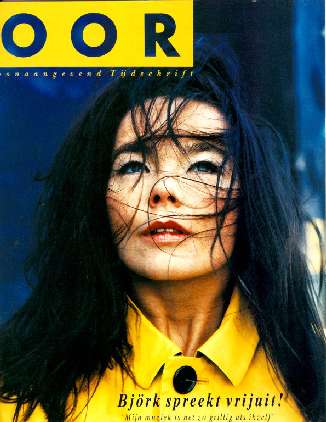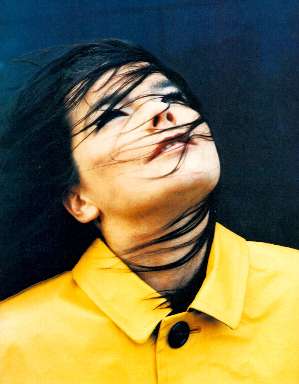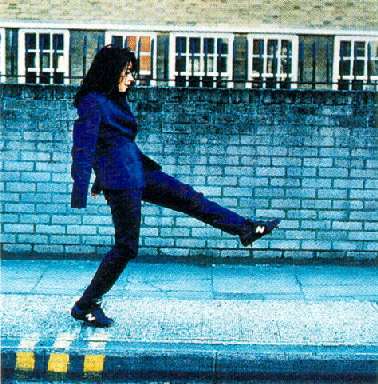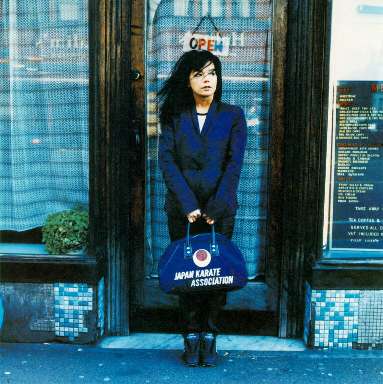Oor (NL) 6/95
Björk Gudmundsdottir speaksInterview by ?Photography by ?
The nail on the head: Post, the new album by Björk, flutters from industrial to ambient and from technopop to bigband-swing. And the 29-year-old Icelandic phenomenon herself? Well, during previous meetings, we usually encountered a capricious and reticent being; this time we hardly got a word in edgewise. Björk Gudmundsdottir speaks. |
|
"I love nature, I love being outside. In Iceland I used to walk outside
singing all the time as a child. I wasn't used to anything else. I must have
sung that way for ten, fifteen years before I first saw a microphone. From
that moment on, singing only became more difficult for me. For one thing, I
really had to get used to standing still during recording. It just felt
completely unnatural.
"In many ways, Debut was still much in the sign of conflicts. Conflicts with
myself and with the outside world. I was wondering whether I had the right
to fill an album with nothing but my own songs.
Could I be so selfish? And did I have the right to tell others what to do?
I didn't think so. That was a little bit my problem: I really wanted to
work with other people, but I didn't want to dominate them. I wanted those
people to surprise and stimulate ME. If I knew exactly what they were going
to do, I was no longer interested. I had to get something in return. But
that has changed a lot by now; I learned what is necessary, the past two
years. I mean, I grew up with the Punk state of mind: I really believed in
anarchy and thought that one person shouldn't be controlled by another. But
it's not that simple. True, it is a beautiful philosophy and I still believe
in it for a part, but if too many people work on the same thing, it loses
its identity. Like if a large number of people build one house and everyone
puts in some ideas of their own, then it's no longer a house; then it's a
compromise. |
|
|
|
"I've shaken two more inheritances from the punk ideology: firstly, the
conviction that musical ineptitude also means musical freedom. Those punk
bands can say what they want, but that is absolute bullshit. If you don't
have any technique, if you don't know what you're doing with your instrument,
then you don't have a lot of freedom, no, then you are very limited: your
horizon is very small. The more knowledge and technique, the more space and
freedom. The same goes for discipline. I used to think that discipline
stood in the way of any form of free expression. But the contrary is true.
If you can, like I now can, gather enough discipline to, for instance, do
interviews for twelve days and talk about nothing but yourself all that time,
you reate an enormous freedom for yourself: you can say what you want.
"Secondly, there was the stubborn clinging to the do-it-yourself principle;
I got rid of that as well. The annoying things, the dirty jobs, I still do
myself because I think I'm responsible for that, but creatively I work with
as many people as possible. Over the last few years I learned that one and
one isn't necessarily two: the result of your input and that of someone else
usually has a little extra. So one and one is often three. And since I know
that, I'm capable of doing 900 interviews without getting suicidal tendencies,
or playing the same song five times a week when I'm on tour without getting
bored with it. I _know_ that the sum of time, place, things and people always
has a different result. Things like that make my job something exciting,
something precious.
"Luckily, my punk roots have never led to a political position. I know it's a
cliche, but I don't think I have the right to tell other people what to do or
how to think. My political conviction is inside of me. It's about choices
like: do I control you or should you control me? I love him; do I have to
make him love me as well? This girl wants to kill herself; should I try to
get her to change her mind, or is it her own choice? Should I give or take?
That's what it's all about with me. That is, as far as I'm concerned, what
pop music is all about: helping people with their personal politics, their
emotional problems and how they have to sympathise with that. Not by forcing
things on them, but by showing them how I feel about certain things. Then
they can do what they want with that. I prefer doing that over offering
ready-made solutions.
"On Debut I looked back on what had happened to me the 10 years before and on
Post I look back on the last two years; the period after Debut. Just to
conclude that nothing's really changed. Because that is the biggest misunder-
standing there is about me: people think that my life has changed enormously
since Debut's success. But I've bee accostumed to attention and success all
my life. On a small scale, true, but still: at eleven I was already a
celebrity in my village of birth. Singing in the local pub, you know. I'm
used to being watched, analysed and criticised. At an early age I learned to
be a public figure and act like one. I then made the decision to do what I
want for the rest of my life. After all, I'm the only one who knows what's
right for me. The drawback is: normal people can still just go to the hair-
dresser to have their hair cut. If I do that, people will immediately say:
"Still I managed to keep a very naive, childish view on life. A lot of people
either attack me on that, or think it's cute, but I
see it in the first place as a compliment. Without that childish side of me,
a song like Modern Things could never have come about.
In that song I propose that alle new things, all modern inventions already
existed for a very long time, but that they were just locked away in a
mountain somewhere, waiting for the right moment. I wrote that just to pester
a few friends of mine. They're terrified of modern technology. They feel
guilty about using computers and driving cars. Because it's not natural. I'm
just as tired of views like that as of statements like 'Computer music doesn't
have soul'. Of course it hasn't got soul, because nobody put it in there! You
can't epect a computer to put soul into music? I mean, you can't expect a
guitar to write a song? They're instruments, tools. And you should be proud
of that. But those friends of mine think it's all very spooky; they think
technology is going to replace all human actions and that pretty soon they
won't have to be creative, because the computer will take that away from
them. But a hundred years ago, when the telephone was invented, people thought
that people would no longer talk to each other in the flesh. Inventions don't
take anything away from you; they just increase the number of options.
|
|
|
|
'That musical capriciousness has always been there: I've classical music
lessons, I've been in a punk band, I've played drums, produced a heavy metal
band, made filmmusic... Just one thing isn't enough. I want to try it all.
I found my equal when it comes to those things in someone like Tricky; I
worked with him for a couple of songs on Post. Actually, he's worse than I
am. He's completely obsessed by anything that's unpredictable. If you tell
him to go left, he'll go right. If you tell him to go see a dentist, he'll
take it as: whatever you do, DON'T go see a dentist! I love that.
'I did Headphones with Tricky, sort of a thank-you to a friend who always
sent me tapes with his favourite music. I saw that as one of the most
beautiful and valuable gifts somenone can give you. Such a tape says so much
about someone's personality and about what that person wants to tell you. I
always saved a tape like that until it was evening, all the work had been
done, I was all alone and had taken a bath. Then I'd lie on my bed, with my
headphones on, to slowly fall asleep, listening to that tape. That's what that
song is about. There's little sounds in there to amplify the effect of rest,
solitude and dreaminess.
"Maybe my whimsicality is typically Icelandic. Just like my energy. Compared
to other Europeans, the Icelanders are pretty extreme. When they're happy,
they're extremely happy; when they're angry or introvert, they're angry or
introvert in a big way. There's no middle of the road. Slightly talkative,
that's impossible. The Icelandic climat helps too, it's just as fickle. The
country is in the middle of the ocean, there's always wind, there's vulcanoes,
hotwater springs, mountains, lava, blizzards... The weather is very important
over there. Compared to Iceland, Amsterdam is like being inside all the time.
That's the beauty of Reykjavik, for instance: One one hand, you're surrounded
by nature in all its raw unpredictability and on the other hand technological
developments are VERY advanced. Furthermore, Iceland is, measured with respect
to population density, the fourth richest country in the world. The modern
and the primitive balance each other perfectly. I love contrasts like that
and that probably shows in my music.
"My moving to London probably only affected the practical side of my work.
It's a cosmopolitan city, with all the provisions and people I need. Reykjavik
doesn't. For the rest, the move meant at most the start of a new fase in my
life: in the time before it - the Sugarcubes era - it always felt very safe
and comfortable to make music with other people and not have to many responsa-
bilities. But I've thrown all that overboard. I realised: It's now or never.
I make that solo-album now, or else I never will. I'm glad I did, because now
I know I can never go back: it feels as safe and comfortable as the time with
the Sugarcubes.
"People often ask me if I know why I only became really famous after I traded
the Sugarcubes for a solo career. But I don't really understand that myself.
Even though I do have a suspicion. #There's a strange kind of law that says:
the more selfish you do something, the stronger the result will eventually
be.# I started on Debut with that idea. I made that record from a completely
egoistic point of view: I was only pleasing myself and making a record _I_
would buy. Because if I'd concentrated on other peoiple's tastes and on the
question whether other people would appreciate what I did, a sort of
compromise-album would have emerged. And you can hear something like that
right away: an album like that just radiates insecurity and doubt. Because
of that too, a lot of people thought that Debut was a very string, very
powerful album, I think. But you know, maybe Post is another story and
nobody likes it. |
|
|
|
"After a while, the joke became a job, a profession. And then it went
wrong. At least where I'm concerned. Before the Sugarcubes I was in
K.U.K.L., a punk band, and that was much more important to me. The
KUKL-period taught me a lot of valuable lessons in a quick and violent
way. That band really changed me. But the Sugarcubes....Maybe you should
put it in a timeframe: the group was founded in a very lively, fertile
time. Of course Iceland is very small and we were bored to death, so we
wanted some action. We started developing lots of activities, which
eventually led to one big commune of artists. We supported each other,
started a little company to publish poetry and literature,
we ran a radio station, we had a coffeeshop that doubled as bookstore...
And everyone helped each other. It was a hot-bed, a breeding pit. All
very exciting. And the poets who were used to getting drunk together
every weekend, decided to start a pop band. That was the Sugarcubes.
"From that moment on, something changed: the Sugarcubes suddenly became
very interesting and everybody wanted them to become world famous. And
the strange thing is that we actually started striving for that, even
though everybody had other occupations as well. But we knew that we would
regret it forever if we did NOT do it. In the end it was another two
years before we signed a contract with a record company, because even
though everybody wanted us, we were always very stubborn and pig-headed;
for instance, we refused for a long time to sing in English. Eventually
it went awry because the group didn't have enough priority for some
members. They thought that other things were more important. I hated the
fact that we were splitting up. I cried several nights. Later, I was glad
we had made that decision: you shouldn't milk out a joke for too long.
"At the moment I try to take my career a bit more serious. I have to,
because I carry the responsability for a lot of people; they live off my
music. I've finally accepted that singing is my call in life. I don't
know how to do anything else and I've never known anything else. At
least, not that well. Furthermore,
singing is one of my primary needs, just like sleeping, eating and sex.
And getting really drunk sometimes. If I don't do those things, I go
crazy. Or get ill. And whether I sing once a week in my home town in Iceland
for 50 people in a pub, or do what I do now, I still look at it in the
same way. Singing is singing.
"Where that urge for self-expression comes from, I don't know. Everyone
has something like that, but it's more extreme with me. I was born with
the need to sing. Even worse; I was one of those kids from that famous
cliche: I could sing before I could talk. |



